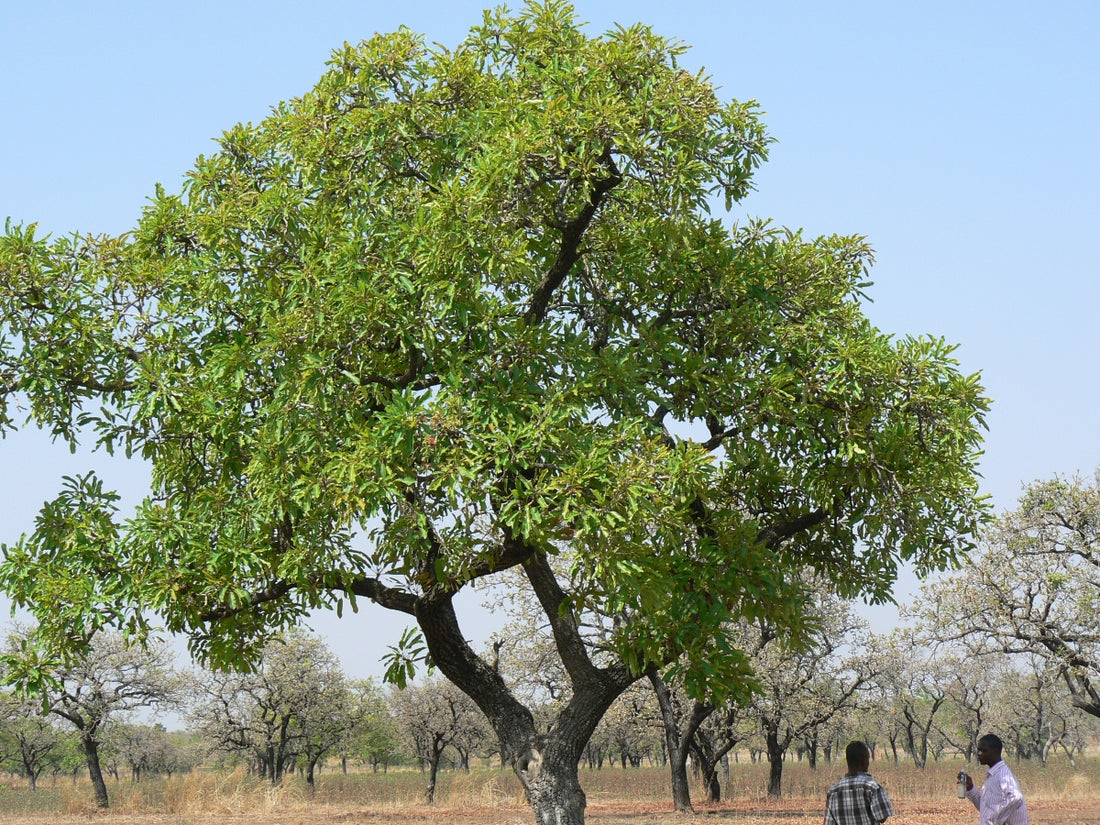Hello readers! Welcome to the Fode Naturals Blog "The Natural Way".
Today we will be talking about Shea butter, what it is and how it came about.
Shea butter has been a part of West African history for hundreds, if not thousands, of years. It has been used for food, medicine, artistry and much more! This magical substance is made from the seed of the shea fruit. The Shea tree, also known as Vitellaria Paradoxa or Butyrospermum parkii, grows naturally on the dry savannah belt of West Africa from Senegal in the west to Sudan in the east, and onto the foothills of the Ethiopian highlands. The shea tree is often called the "tree of life" by African communities because it has a long history of use in food, cosmetics, and medicine. The tree takes about 10-15 years to start producing shea fruits and fully produces at ages 20-30. A typical Shea tree can live up to three centuries and can produce fruits for up to 200 years!
The shea fruit is a small earth-green, soft-skinned fruit. It is semi sweet and has a mushy consistency, with a oval-like seed in the middle of the fruit. The "butter" in shea butter comes from the seed of the shea fruit, which happens to contain a unique composition of fatty acids. Shea butter is made by the local African women and men using a process that has been passed down for generations.
The Original way Shea butter was made
The original way of making Shea butter includes gathering the shea nuts, then burying them underground for a couple weeks in order to soften the shell of the nut, which is then peeled off to expose the rich fatty acids found it the nut. After exposing the center of the nut, it is then pulverized into a paste either with stones or the traditional African wooden mortar and pestle. After the shea nuts have been pulverized, the paste is then heated in a large pot to separate the desired fatty acids and vitamins from the rest of the mix, which leaves us with a thick paste of goodness known as shea butter.
As you can see, the traditional method of extraction is lengthy and some may consider it to be labor intensive, which is why there has been more modern ways of making shea butter, though nothing compares to the original way.
Benefits of Shea butter
- Moisturizing: The concentration of natural vitamins and fatty acids such as vitamins A, E, and F in shea butter makes it incredibly nourishing and moisturizing for skin. It is often used to remedy dry skin and to help protect the skin’s natural oils. There have been studies where Shea butter has been helpful in relieving psoriasis, eczema and other skin conditions.
- Reduces Inflammation: Past studies found that due to its cinnamic acid and other natural properties, shea butter can be anti-inflammatory. One compound in particular, lupeol cinnamate, was found to reduce skin inflammation and even potentially help avoid skin mutations. This also makes it beneficial for some people with acne.
- Skin Smoothing, Anti-aging properties: Shea butter aids in the skin’s natural collagen production and contains oleic, stearic, palmitic, and linolenic acids that protect and nourish the skin to prevent drying. With long-term use, many people report skin softening and strengthening as well as wrinkle reduction.
- Food and Cooking: In Mali, many people cook with Shea butter, adding high quality fats to their food's nutrition. It is a great alternative to vegetable oil as it offers nutricious fatty acids, which can be beneficial to one's diet.
Conclusion
So there you have it, shea butter! One of nature's bountiful blessings. Interested in purchasing some shea butter? Not so fast, though we now know how great shea butter is, not all sellers of shea butter will offer you the REAL shea butter you're looking for. In order to be sure you are receiving great quality shea butter make sure you follow this list and you'll be just fine.
- Be sure it is Unrefined
- Be sure is made in or comes from a Sub-Saharan African Country
- Make sure you trust the company that sells it and that they are reputable
Check out our Fode Naturals Whipped Shea butter Moisturizer today in our shop. Our shea butter comes directly from Mali and is guaranteed to be unrefined and organic!
Fun fact: Shea butter has historically been used in African countries to help with nose decongestion, even for babies!

